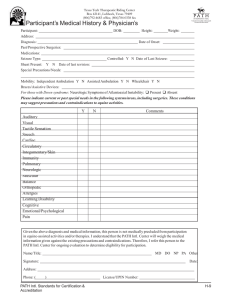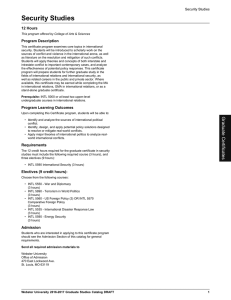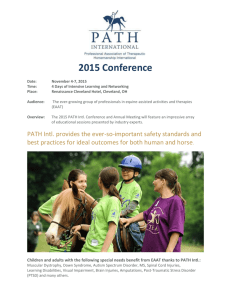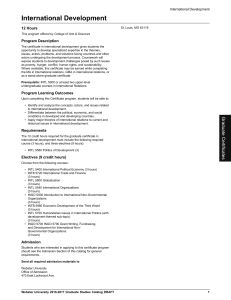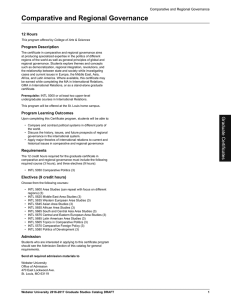Global Water Initiatives: What Do the Experts Think? Leading Figures in the
advertisement
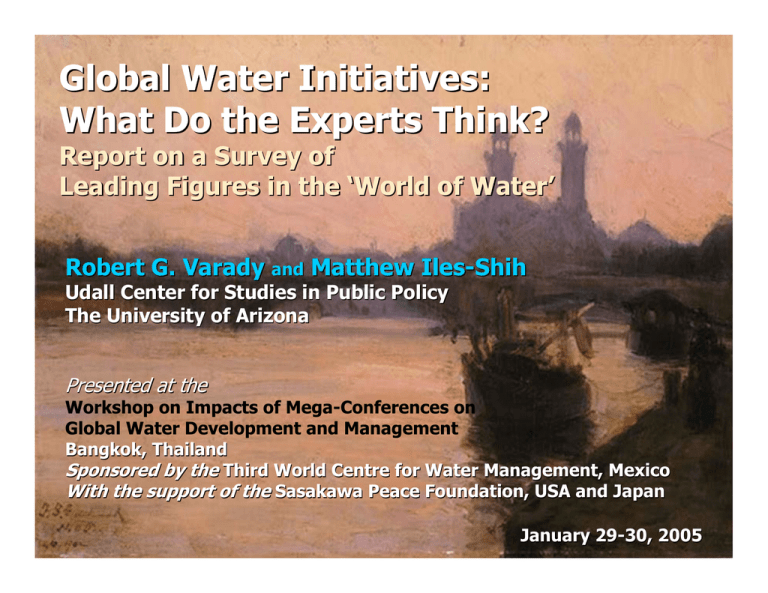
Global Water Initiatives: What Do the Experts Think? Report on a Survey of Leading Figures in the ‘World of Water’ Robert G. Varady and Matthew Iles-Shih Udall Center for Studies in Public Policy The University of Arizona Presented at the Workshop on Impacts of Mega-Conferences on Global Water Development and Management Bangkok, Thailand Sponsored by the Third World Centre for Water Management, Mexico With the support of the Sasakawa Peace Foundation, USA and Japan January 29-30, 2005 Why Study Global Water Initiatives? What are they? GWIs are institutions that aim to advance Origins? Numerous & divergent disciplinary, ideological, Utility? Innovative, useful, practical observations & recomms., Status? Mosaic of initiatives phenomenon poorly understood & Research Questions? knowledge base regarding the world’s inland water and its management. Since 1980s, missions often include active social and policy component. sectoral, institutional. sources obscured by # of voices, variety of approaches unstudied ~ Well-defined network with clear links, traceable influences, unified purpose? Or independent, poorly-connected, competing? ~ Have initiatives made a difference? Purpose of Paper & Hypothesis Purpose: To report on the survey. How: Via written materials and use of two survey instruments, In the process, the validity of the hypothesis will be assessed. Working hypothesis: The numerous existing global water initiatives frequently have duplicative aims and have overproliferated. Expectation: Experts in the field would tend to minimize salutary influences of GWIs and advocate their consolidation or selective elimination. Roots of Water Consciousness and its Internationalization 1945 . . . WW II ends . . . Multinatl. ways to avoid wars ~ Reduce conflict by improving human conditions ~ UN agencies for health, nutrition, educ./sci., human rights, . . . ~ ~ ~ ~ 1950-60s . . . UN prompts 1st global resources initiatives Intl. Geophysical Year, 1957-58 Arid Zone Programme, from 1950 Intl. Hydrological Decade, 1965-74 Man & the Biosphere Programme, 1971-present 1945-late 1970s . . . Ambitious, large-scale waterworks ~ Dams, irrigation, drainage; hydro plants; interbasin transfers ~ Signals of 20th C progress, centrality of water to society Evolution of Organized Efforts: Professional Societies Increased intl. signif. of water birth of numerous institutions to advocate one or another of its aspects Prof. societies long in vanguard of this advocacy For professionals of various stripes to share intellectual spaces & expertise, and promote basic & applied research Evolution of Organized Efforts: Professional Societies Intl. Navigation Assoc. (PIANC) . . . . . . . . . . . . . . . . . . . . . . . . . . . . . . . 1885 Commission Internationale des Glaciers . . . . . . . . . . . . . . . . . . . . . . . . . 1894 Intl. Union of Geodesy and Geophysics (IUGG) . . . . . . . . . . . . . . . . . . . 1919 Intl. Assoc. of Hydrological Sciences (IAHS) . . . . . . . . . . . . . . . . . . . . . 1922 Intl. Assoc. of Theoretical and Applied Limnology (SIL) . . . . . . . . . . . . 1922 Intl. Council for Science (ICSU) . . . . . . . . . . . . . . . . . . . . . . . . . . . . . . . . 1931 Intl. Assoc. for Hydraulic Research (IAHR) . . . . . . . . . . . . . . . . . . . . . . . 1935 World Irrigation and Drainage Congresses . . . . . . . . . . . . . . . . . . . . . . . 1951 Intl. Assoc. of Hydrogeologists (IAH) . . . . . . . . . . . . . . . . . . . . . . . . . . . 1964 Intl. Water Resources Assoc. (IWRA) . . . . . . . . . . . . . . . . . . . . . . . . . . . 1973 Intl. Water Assoc. (IWA) . . . . . . . . . . . . . . . . . . . . . . . . . . . . . . . . . . . . . 1995 Intl. Water History Assoc. (IWHA) . . . . . . . . . . . . . . . . . . . . . . . . . . . . . . 2001 Evolution of Organized Efforts: International Hydrological Decade & Its Origins Effects of Postwar Polarization Isolation of professionals from counterparts Ideological differences in science & tech. Gulf in content of science Responses: Call for global programs Intl. Geophysical Year (IGY), 1957-1958 Intl. Hydrological Decade (IHD), 1965-74 IHD Objectives Collect hydrological data Research problems Assess resources & budget balances Facilitate info. exchange Educate & train Evolution of Organized Efforts: International Hydrological Programme (IHP) Last action of IHD: large scientific conf. in Paris in 1974 Question: how to harness IHD energy, carry forward unfulfilled ambitions IHD seen as 1st part of long-term program UNESCO’s 1974 Gen. Conf. took lead in transforming IHD into periodically renewable International Hydrological Programme (IHP) The International Hydrological Programme (IHP) Goal similar to IHD: strengthen connections between science research, applic., & educ. on water From 30 member states & 19 observer nations to 164 natl. committees Redefined every 6 yrs., admin. by UNESCO Phased approach to permit adaptation & redefinition Since 1981 emphasizes practical, rational mgt. of water resources; since 1990 “sustainability” central Sees itself as permanent forum to encourage multinational coop. & innovation in water sci. & mgt. Types of Institutions and Processes Next slides describe following types of initiatives Designated periods Organized events Intergovernmental & nongovernmental organizations Types of Institutions & Processes: Designated Periods Designated Period Years Intl. Hydrological Decade (IHD) 1965-74 Intl. Drinking Water Supply & Sanit. Decade (DWSSD) 1981-90 Intl. Year of Freshwater (IYF) Intl. Water for Life Decade 2003 2005-15 Types of Institutions and Processes: Organized Events ___________________ Types Forums, conferences, megaconferences Topics All-inclusive environ. themes vs. water only Size Last 2 World Water Forums, 5,000, 10,000+ Participants More interdisciplinary, more NGOs Agendas Problem-framing principles: sustainability, biodiversity, IWRM, bottom-up, equity Results ~ Well-intentioned declarations ~ But idealistic, largely unimplemented ~ Most common outcome: “networking” Types of Institutions & Processes: Events & Declarations Organized Event: Declaration Year Venue UN Conf. on Human Envir.: Stockholm Declaration 1972 UN Conf. on Water: MDP Action Plan 1977 Intl. Conf. on Water & Envir.: Dublin Statement 1992 UN Conf. on Envir. & Devel.: Agenda 21 1992 First World Water Forum: Marrakech Declaration 1997 Intl. Conf. on Water & Sust. Devel.: Paris Declaration 1998 2nd World Water Forum: World Water Vision 2000 UN Millennium Assembly: Millennium Declaration 2000 Intl. Conference on Freshwater: Minist. Declaration 2001 World Summit on Sust. Devel.: Jo’burg Plan of Impl. 2002 Third World Water Forum: Kyoto Minist. Declaration 2003 Stockholm Mar del Plata Dublin Rio Marrakech Paris The Hague New York Bonn Johannesburg Kyoto Types of Institutions & Processes: Independent, Multilateral Initiatives AIDA (Intl. Association for Water Law) AWRA (Amer. Water Resources Assoc.) CWS (IGU Comm. on Water Sustain.) DWC/CPWC (Dialogue/Co-operative Prog. on Water & Climate DWFE (Dialogue on Water, Food & Envir.) GEWEX (Global Energy & Water Cycle Exp.) GIWA (Global Intl. Waters Assess.) GWP (Global Water Partnership) GWSP (Global Water System Project) HELP (Hydrol. for Environ., Life & Policy) IAH (Intl. Assoc. of Hydrogeologists) IAHR (formerly Intl. Assoc. for Hydraulic Research) IAHS (Intl. Assoc. for Hydrol. Sci.) ICID (Intl. Comm. on Irrig. & Drain.) ICOLD (Intl. Comm. on Large Dams) ICSU (Intl. Council for Science) IHDP (Intl. Human Dimensions Prog. on Global Envir. Change) IHP (Intl. Hydrological Programme) INPIM (Intl. Netw. on Particip. Irrig. Mgt.) IPCC (Intergov. Panel on Climate Chg.) IUCN (World Conservation Union) IUGG (Intl. Union of Geodesy and Geophysics) IWA (Intl. Water Association) IWALC (Intl. Water Assoc. Liaison Committee) IWMI (Intl. Water Mgt. Institute) IWRA (Intl. Water Resources Assoc.) MDGs (Millennium Development Goals) PCCP (From Potential Conflict to Cooperation Potential) PIANC (Intl. Navigation Association) Ramsar (Ramsar Conv. on Wetlands) UN Eco. Commission for Europe WCWTC (World Comm. on Water for 21st C) WHO (World Health Org.) WMO (World Meteorological Org.) WWAP (World Water Assessment Prog.) WWC (World Water Council) WSSCC (Water Supply & Sanit. Collab. Council) Survey Methodology Respondent Types Identified Completed at least 1 survey Response rate (%) Representatives 54 34 63 Observers 62 37 60 Males 90 64 71 Females 26 7 27 Survey Methodology Response Summary Action No. of individuals % of initial survey pool Contacted 116 100 Declined to participate 9 8 No response 27 23 80 68 100 71 61 89 Long form & interview 53 46 66 Short form 56 48 70 Agreed to participate Completed 1 or both forms % of those agreeing to participate Professional Societies ______________________________________________________ Program Year Influence rating estab. (1 to 5; with 1 = best) _____________________________________________________________________ Intl. Assoc. of Hydrological Sciences (IAHS) Intl. Assoc. of Hydrogeologists (IAH) Intl. Water Association (IWA) Intl. Water Resources Association (IWRA) IAHR (Intl. Assoc. of Hydraulic Research) Intl. Water Assocs. Liaison Comm. (IWALC) All professional societies 1922 1956 1999 1972 1935 2000 2.30 3.04 3.08 3.15 3.22 3.79 3.10 Designated Periods _____________________________________________ Program Influence rating (1 to 5) _________________________________________________________ International Hydrological Decade (IHD) Intl. Year of Freshwater (IYF) Intl. Drink. Water Supply & Sanitation Decade 2.69 3.12 3.40 All time periods 3.07 Organized Events _______________________________________________________________ Program Year Influence estab. (1 to 5) _______________________________________________________________ Intl. Conf. on Water & Envir. (ICWE) Dublin 1992 2.17 UN Conf. on Envir. & Devel. Rio 1992 2.39 Second World Water Forum (SWWF) The Hague 2000 2.50 Millennium Assembly NY 2000 2.53 Third World Water Forum (TWWF) Kyoto 2003 2.56 UN Conference on Water (UNCW) Mar Del Plata 1977 2.86 Intl. Conference on Freshwater (ICF) Bonn 2001 3.13 UN Conf. on Human Envir. Stockholm 1972 3.16 First World Water Forum (FWWF) Marrakech 1997 3.37 Intl. Conf. on Water & Sust. Devel. Paris 1998 3.73 All events 2.84 Intergovernmental & Nongovernmental Organizations ___________________________________________________________ Program Year Influence estab. (1 to 5) _____________________________________________________________________________________ UNESCO’s Intl. Hydrological Prog. (IHP) World Water Council (WWC) World Water Assessment Prog. (WWAP) Global Water Partnership (GWP) Hydrology for Envir., Life & Policy (HELP) Water Supply & Sanit. Collab. Council (WSSCC) GEWEX (Global Energy & Water Cycle Exp.) Dialogue on Food, Water & Envir. (DWFE) Global Water Syst. Project (GWSP) Global Intl. Waters Assessment (GIWA) All organizations 1975 1996 2000 1996 1999 1990 1988 2001 2001 1999 2.38 2.80 2.90 3.02 3.08 3.40 3.43 3.48 3.62 3.88 3.20 Observations and Interpretation Influence Comparative Observations Composite mean score for all 29 GWIs = 3.02 or “C” (2.84 to 3.19). Respondents did not rate influence of initiatives highly. Further evidence of cynicism: Only 11 of 29 “C”; highest was “B-” (2.02.5), for only 5 GWIs; while 4 were assigned “D+” rating (3.5-4.0). Among four categories (societies, time periods, events, organizations), events considered most influential (2.84) and organizations least influential (3.19). Observations and Interpretation Influence Professional Societies IAHS considered most influential (2.30) IAH, groundwater hydrology organization, was second (3.04) IWA, estab. 1999, next at 3.08 IWALC, very recent, lowest-rated at 3.79 Observations and Interpretation Influence Designated Time Periods IHD by far the highest-rated at 2.69; can be seen as inspiration for subsequent time periods At other end, Intl. Drinking Water Supply & Sanitation Decade rated at 3.40, not very influential Observations and Interpretation Influence Organized Events Dublin Conference most highly regarded (2.17); highest score for any GWI. Rio Earth Summit, though less focused, next at 2.39 World Water Forums II (2.50), then III (2.56). WWFI not well known (3.37) Mar Del Plata first to be dedicated to water, its principles widely accepted, but received average ranking (6th of 10) with 2.86 1998 Paris conference ranked last (3.73) Observations and Interpretation Influence Organizations Of 10 rated, IHP scored highest with 2.38 2 of next 3 highest were WWC (2.80) and GWP (3.02). Cooperation or competition? WWAP (2.90) and HELP (3.08), both at UNESCO, also “friendly rivals,” scored similarly Lowest-scoring initiative was GIWA Observations and Interpretation Views and Opinions Role of Governments, NGOs, Stakeholders Overwhelming support for govt. involvement (96%) NGOs (88%), stakeholder groups (93%) also valued Leadership is greatest contribution of govts. (34%) No expectation of funding from NGOs, stakeholder groups NGOs (27%), stakeholder groups (59%) enhance participation Observations and Interpretation Views and Opinions Significant Actions Advancing ideas & practices (49%) Publications most significant (11/36), projects & programs next (10/36) Only 4% of respondents cited conferences & workshops as significant Observations and Interpretation Views and Opinions Program Results Again, meetings & conferences regarded (just 3 of 77) Ideas & practices favored by publications poorly 49%; Trends parallel those for “actions” One difference: only 3% thought developing policies was feasible action, but 10% thought policies had actually resulted Indecision (25 of 77) likely a proxy for skepticism Just 1 respondent saw real difference on the ground Observations and Interpretation Views and Opinions Institutional Overlap Three times as many sought to explain impact (52) as tried to define causes (18) Of those who rated impact, 58% considered it negative 75% thought overlap was prevalent, by implication, too prevalent Half of raters thought impact was significant 28% contended that new initiatives were created for “personal” reasons Observations and Interpretation Views and Opinions Proliferation Attitudes toward proliferation even more negative (64%) than toward overlap (58%) 56% thought it significant 9 of 10 who cited intensified competition as effect, called that a drawback Only 2 of 6 possible effects considered beneficial Observations and Interpretation Views and Opinions Managing Diversity and Proliferation In spite of views that overlap, proliferation negative, a startling contradiction: 82% chose guiding proliferation instead of stopping or limiting it In other words, maybe too many GWIs, but their proliferation should not be limited Flexible management seen as most appropriate option To paraphrase Malin Falkenmark, just as with species, institutional diversity provides richness & variety of approaches, opinions, individuals Observations and Interpretation Views and Opinions Assessing Overall Impact 79% said GWIs had positive or partially positive influence 20% pointed to “real” changes as most significant 20% found that GWIs have exerted influence in “fuzzy” ways such as increasing awareness Similarly, strong support (6/7) for success in improving communication, cooperation, and facilitation (7/8) Conclusions GWIS are of four types Survey 1 allows assessment of relative influence Survey 2 allows testing of hypothesis First part (too many GWIs with duplicative aims) is confirmed Second part (reduce # of GWIs) rejected; instead, strong acceptance of existence, embrace of diversity, interest in helping manage What Does it All Mean? Largest remaining task: Assess actual accomplishments in “world of water” ~ Institut. processes vs. changes caused by demography, development, globalization, . . . ~ Are improvements in conditions due to specific initiatives? ~ Can real changes in policy be attributed to initiatives? To Be Done. . . . Develop instruments to measure progress Gauge effectiveness of activities on the ground Identify programs that have/have not achieved aims Determine ingredients of success and failure Results should interest physical scientists, social scientists, planners, managers, diplomats, leaders of global water initiative phenomenon, and especially decisionmakers
